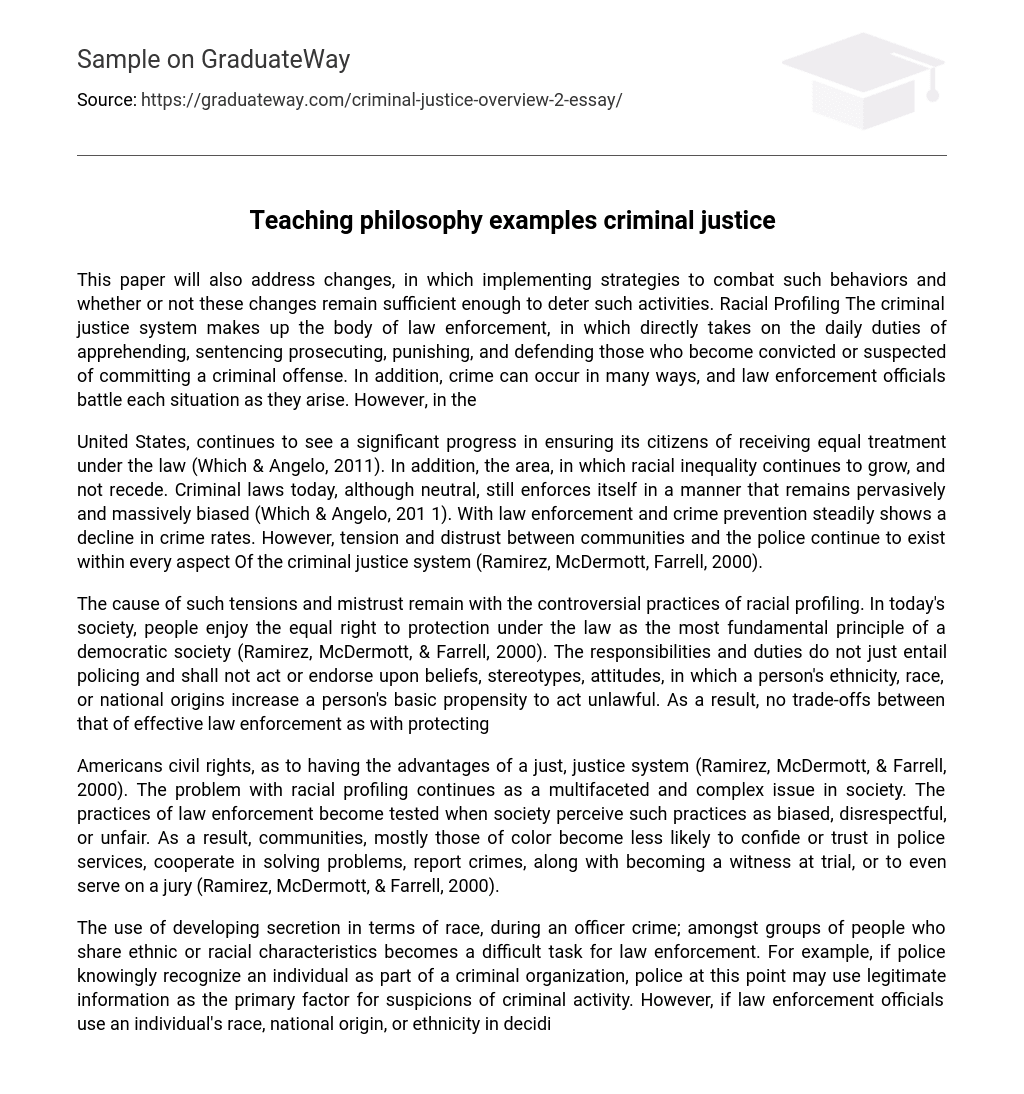This paper will also address changes, in which implementing strategies to combat such behaviors and whether or not these changes remain sufficient enough to deter such activities. Racial Profiling The criminal justice system makes up the body of law enforcement, in which directly takes on the daily duties of apprehending, sentencing prosecuting, punishing, and defending those who become convicted or suspected of committing a criminal offense. In addition, crime can occur in many ways, and law enforcement officials battle each situation as they arise. However, in the
United States, continues to see a significant progress in ensuring its citizens of receiving equal treatment under the law (Which & Angelo, 2011). In addition, the area, in which racial inequality continues to grow, and not recede. Criminal laws today, although neutral, still enforces itself in a manner that remains pervasively and massively biased (Which & Angelo, 201 1). With law enforcement and crime prevention steadily shows a decline in crime rates. However, tension and distrust between communities and the police continue to exist within every aspect Of the criminal justice system (Ramirez, McDermott, Farrell, 2000).
The cause of such tensions and mistrust remain with the controversial practices of racial profiling. In today’s society, people enjoy the equal right to protection under the law as the most fundamental principle of a democratic society (Ramirez, McDermott, & Farrell, 2000). The responsibilities and duties do not just entail policing and shall not act or endorse upon beliefs, stereotypes, attitudes, in which a person’s ethnicity, race, or national origins increase a person’s basic propensity to act unlawful. As a result, no trade-offs between that of effective law enforcement as with protecting
Americans civil rights, as to having the advantages of a just, justice system (Ramirez, McDermott, & Farrell, 2000). The problem with racial profiling continues as a multifaceted and complex issue in society. The practices of law enforcement become tested when society perceive such practices as biased, disrespectful, or unfair. As a result, communities, mostly those of color become less likely to confide or trust in police services, cooperate in solving problems, report crimes, along with becoming a witness at trial, or to even serve on a jury (Ramirez, McDermott, & Farrell, 2000).
The use of developing secretion in terms of race, during an officer crime; amongst groups of people who share ethnic or racial characteristics becomes a difficult task for law enforcement. For example, if police knowingly recognize an individual as part of a criminal organization, police at this point may use legitimate information as the primary factor for suspicions of criminal activity. However, if law enforcement officials use an individual’s race, national origin, or ethnicity in deciding whether a specific person participates as a member of a known criminal organization, it is at this point the police engage in racial profiling.
According to the national survey, Gallup Poll, contest to racial profiling, as with Whites having more favor for police than those of any other race; along with Blacks having lesser favor for the police (Ramirez, McDermott, & Farrell, 2000). With racial biased police stops, creates animosity towards state and local law enforcement, and by failing to address such issues on peoples perceptions Of racial discrimination by police officials within neighborhoods that are of minority, may find law enforcement efforts as fruitless (Ramirez, McDermott, & Farrell, 2000).
Changes in Racial Profiling The changes made to the criminal justice system in respect to racial profiling, involves making the necessary resources availTABLE. In addition to availTABLE resources, making the necessary recommendations to address racial bias becomes the effort put forth to in carrying out the implemented recommendations in its entirety. As a result, the justice system can continue to become more effective by demonstrating regulations and policies set forth by the criminal system.
Department of Justice did name President Bush, and the Bush Administration, as becoming the first president to take on the form f action in regard to banning racial profiling among federal law enforcement agencies (“Fact sheet: Racial Profiling,” 2003). The administration requires more Of a restriction on the use Of race by federal law enforcement officials, than does the Constitution. In addition, routine duties involving patrols must become carried out without race playing a factor. The police engage in everyday activities, such as foot and traffic patrols.
These patrols can lead to police using his or her discretion, which race cannot play a factor. The media coverage display stories about police brutality, racial profiling, and police conducts in the media on a daily basis. More so than often, blacks and Hispanics becomes the target of racial profiling during routine traffic stops, for the images the media may display about specific races. Sufficient Changes In one’s opinion on the sufficiency of the above information, such incidents still continue to exist, with police targeting certain races by racial profiling.
For example, Hispanics may become known for displaying violent behaviors, and drug trafficking, which gives police the assumption every Hispanic person continues with the same behaviors (Travis, 2012). As a result, Hispanics may come the target of racial profiling by police officers. The changes made to combat such behavior remains insufficient, because police still partake in such activities. As a result, the media coverage displays such images on a daily basis, with police brutality, or the use of force.
In one’s opinion, the changes necessary to make the justice system more effective at combating racial profiling is to implement a jail or prison sentence for officers who participate in misconduct. In addition to such changes, removing officers from his or her duties and authority can prevent future police misconduct (Travis, 012). Law enforcement officials deal with a wide range of criminal activities, which cause officers to use his or her discretion.





